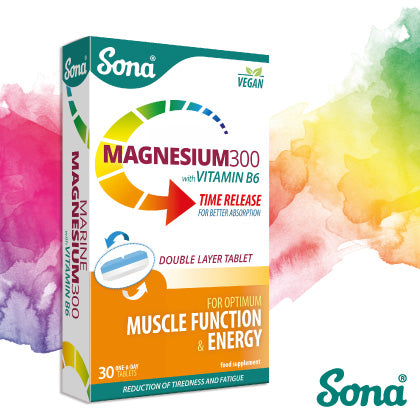
Magnesium is one of seven essential macrominerals, the minerals that are required in amounts of 100mg or more per day.
Magnesium is involved in over 300 enzyme processes in the human body, such as bone structure, muscle and nerve function, blood pressure regulation and immune support. While magnesium can be sourced from the diet, studies suggest that 75% of individuals do not meet their dietary requirements.
Below are 5 benefits of magnesium:
- Supports biochemical reactions: Magnesium is present within every cell in your body, and each cell requires it to function correctly. Magnesium plays a role in energy creation, protein formation, gene maintenance, muscle movements, and nervous system regulation.
- Boosts exercise performance:Your body requires 10-20% (dependent on the exercise) more magnesium when exercising, in comparison to when resting. Magnesium aids in the movement of blood sugar to the muscles as well as the removal of lactate, which can accumulate during exercise and produce feelings of fatigue.
- Reduces insulin resistance:Insulin resistance is characterized by muscle and liver cells’ impaired ability to efficiently absorb sugar from the bloodstream. Magnesium is an important component in this process.
- Promotes sleep: Magnesium plays a key role in many of the steps that allow the body to utilize protein and convert it into the chemicals that promote sleep. Magnesium also helps relax the nervous system, which further enhances feelings of sleepiness, as well as muscle relaxation. Moreover, magnesium also aids in the maintenance of GABA (gamma-aminobutyric acid), a neurotransmitter that is in charge of “switching off” wakefulness.
- Blood pressure regulation: Research has shown that magnesium supplements may contribute to the lowering of blood pressure by increasing the production of nitric oxide, a signaling molecule that helps relax blood vessels.
Sona Magnesium300 with Vitamin B6 is made with the highest quality sea water obtained Magnesium and Magnesium oxide with added Vitamin B6. Each tablet provides 300mg of elemental magnesium per tablet.
References
- Borghi, C., & Cicero, A. (2016). Nutraceuticals with a clinically detectable blood pressure-lowering effect: a review of available randomized clinical trials and their meta-analyses. British Journal Of Clinical Pharmacology, 83(1), 163-171. doi: 10.1111/bcp.12902.
- Castiglioni, S., Cazzaniga, A., Albisetti, W., & Maier, J. A. (2013). Magnesium and osteoporosis: current state of knowledge and future research directions. Nutrients, 5(8), 3022–3033.
- Chen, H. Y., Cheng, F. C., Pan, H. C., Hsu, J. C., & Wang, M. F. (2014). Magnesium enhances exercise performance via increasing glucose availability in the blood, muscle, and brain during exercise. PloS one, 9(1), e85486.https://doi.org/10.1371/journal.pone.0085486.
- Ettehad, D., Emdin, C. A., Kiran, A., Anderson, S. G., Callender, T., Emberson, J., Chalmers, J., Rodgers, A., & Rahimi, K. (2016). Blood pressure lowering for prevention of cardiovascular disease and death: a systematic review and meta-analysis. Lancet (London, England), 387(10022), 957–967.https://doi.org/10.1016/S0140-6736(15)01225-8.
- Gröber, U., Schmidt, J., & Kisters, K. (2015). Magnesium in Prevention and Therapy. Nutrients, 7(9), 8199–8226.https://doi.org/10.3390/nu7095388.
- Guerrera, M. P., Volpe, S. L., & Mao, J. J. (2009). Therapeutic uses of magnesium. American family physician, 80(2), 157–162.
- Nielsen, F. H., & Lukaski, H. C. (2006). Update on the relationship between magnesium and exercise. Magnesium research, 19(3), 180–189.
- Rosanoff, A., Weaver, C. M., & Rude, R. K. (2012). Suboptimal magnesium status in the United States: are the health consequences underestimated?. Nutrition reviews, 70(3), 153–164.https://doi.org/10.1111/j.1753-4887.2011.00465.x.
- Rude, R. K., Singer, F. R., & Gruber, H. E. (2009). Skeletal and hormonal effects of magnesium deficiency. Journal of the American College of Nutrition, 28(2), 131–141.https://doi.org/10.1080/07315724.2009.10719764.
